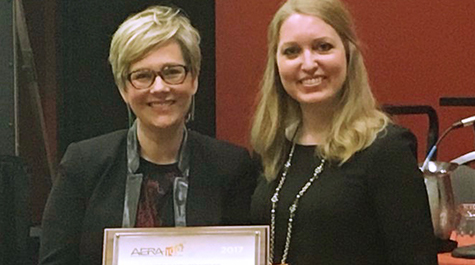Johnson receives prestigious early-career award for research on writing education
For Assistant Professor of English Education Lindy Johnson, education research begins and ends in the classroom. The real, everyday needs of teachers, along with her passion for writing, fuels and inspires her research. Throughout her career, she has explored ways to partner with schools to support teachers as they incorporate writing instruction and digital tools in the classroom.
Her work was recently recognized by the American Educational Research Association (AERA) with the 2017 Steve Cahir Early Career Award for Research on Writing. The award, offered through the Writing and Literacies Special Interest Group, is presented to individuals who show excellence in early scholarship in writing and literacies research.
“We are thrilled that Dr. Johnson’s work has been recognized with this prestigious award,” said Spencer G. Niles, dean of the William & Mary School of Education. “She has distinguished herself as a talented researcher and an intellectual leader. Her work with teachers and schools demonstrates an extraordinary commitment to improving the educational experience for students and inspiring a new generation to discover the joy of writing.”
Johnson’s research grew out of her experiences as an English teacher in Boston Public Schools, where she explored how new digital tools could expand her students’ literacy practices. She saw firsthand how these tools made writing more relevant for her culturally and linguistically diverse students and encouraged them to think more deeply about writing.
While pursuing her Ph.D. at the University of Georgia, Johnson embarked on the research that would become her dissertation and, ultimately, a string of published manuscripts. She developed a school-university partnership with a small rural school district outside Atlanta that was severely under-resourced. In the district, only 50% of students had internet access at home, and there were few resources for after-school programs and enrichment activities.
Over the course of two years, Johnson developed a workshop series for the district’s 12 secondary English teachers. Through the workshop, the teachers engaged with ideas related to both the teaching of writing and the integration of digital tools in that teaching. “We were trying to get beyond those five-paragraph essays and encourage teachers to think about writing more broadly, and in ways that would be more relevant to their students’ lives,” said Johnson.
The study was funded by an Improving Teacher Quality Grant, totaling $72,633 over the two years. Peter Smagorinsky, her doctoral advisor at UGA, said, “Lindy set herself apart from most doctoral students by hiring her major professor as an assistant on a grant of her own conception, a role I was happy to play given Lindy’s immense talents in every aspect of the project.”
Her dissertation study led to a number of publications, including “Writing 2.0: How English Teachers Conceptualize Writing with Digital Technologies,” published in the journal English Education.
Since arriving at William & Mary, Johnson has continued to pursue her research at the nexus of technology and writing. She is co-director of the school’s Center for Innovation in Learning Design, leading research, curriculum and professional development projects centered around helping teachers develop innovative deeper learning practices.
Throughout her work, Johnson’s focus has been on helping teachers evolve their thinking about how to use technology in the classroom. “It’s not about giving teachers technology tools,” she said. “It’s about giving them conceptual tools that can fundamentally change how they approach their teaching.”
